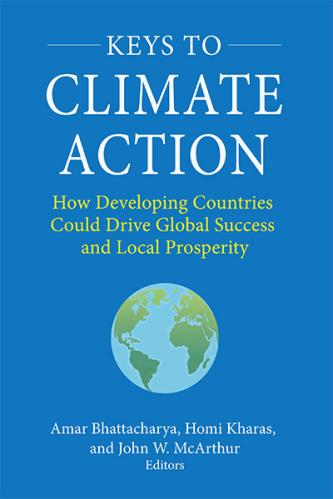Content from the Brookings Institution India Center is now archived. After seven years of an impactful partnership, as of September 11, 2020, Brookings India is now the Centre for Social and Economic Progress, an independent public policy institution based in India.
Petroleum industry is in terrible shape. Brookings India chairman and former CEO of Shell Vikram S Mehta details what the Finance Minister can do to put it back on track.
I am one of the quick-fire commentators who complimented the finance minister on budget day for both affirming fiscal rectitude and addressing the challenge of growth and rural distress. On closer reading of the fine print, I hold on to my initial reaction. This said, I was concerned at the brevity and imprecision of his comment on the energy sector. I did not expect a more detailed pronouncement — the budget is not the occasion for sectoral policy statements — but I did expect a clearer enunciation of intent, especially since energy has been an important part of the prime minister’s agenda. This lack of clarity did lead to a sharp reaction from the market. The stock price of ONGC tanked by 10 per cent.
It also triggered, in my mind at least, three fundamental questions: Does the government appreciate the severity of the crisis facing the petroleum industry? Is it serious about reviving domestic oil and gas exploration? And is its emphasis on clean energy substantive or a rhetorical flourish?
The Finance Minister (FM) made three policy announcements. The first was that the price of gas from newly discovered fields would be determined through the market and linked to the price of alternative fuels. It was not clear, at least initially, whether “newly discovered” meant discoveries yet to be made or those already made but not monetised. It was also not clear whether the price would be linked to low-priced coal, the higher-priced imported liquefied natural gas or to a fuel between these two price points.
The second was to switch the calculation of cess on oil production from a specific rate (fixed rupees per barrel produced) to ad valorem (percentage of value). This is what the companies had lobbied for and it was a sensible move. The fixed charge of $9.1 per barrel produced was affordable when prices were hovering around $100 per barrel but a crushing burden in the current low price regime of around $35 per barrel. What took the wind out of this proposal was the ad valorem rate of 20 per cent. For, at that rate, the tax burden came down by only $2 per barrel from $9 to $7 and for so long as the price of oil remained in the current range. In the event prices rise to the average level predicted by analysts of $45 per barrel in 2016, this benefit will be wiped out and companies will find themselves in the same financial straits they are in today. I can understand the FM’s logic for imposing the tax. He needs the money. But what I cannot understand is the illogic of, on the one hand, expecting ONGC/ OIL to increase domestic exploration and, on the other hand, sequestering almost 25 per cent of their revenues through this indirect tax.
The FM’s final doff to the energy sector was to double the cess on coal production from Rs 200 to Rs 400 per tonne, and to direct that this money be used for financing clean energy. Again, like the switch to ad valorem, this was a positive.
There was a lingering concern, however, that this money would be diverted for other purposes. So far, the clean energy fund has been managed by the finance ministry. The money has not always gone towards clean energy research but for financing unrelated activities like cleaning the Ganges. This concern might have been allayed somewhat had the FM assured listeners that the money would be managed by people with domain expertise and not subject to political or financial exigency.
The government must internalise three hard truths: One, India’s dependence on oil and gas imports will increase in the short to medium term. We currently import around 75 per cent of our requirements. This will go up to near 90 per cent by the end of this decade. We are and will remain hugely vulnerable to the vicissitudes of the international market.
Two, the petroleum industry is in terrible shape. According to consultants Wood Mackenzie, every private oil company loses cash at $30 per barrel. All are now on a massive cost-cutting exercise. They estimate that over the period 2015-2017, the companies will take out $200 billion of expenditure and that exploration investment will drop from around $95 billion in 2015 to less than $40 billion in 2016. Cost-cutting will not save the highly leveraged companies from bankruptcy and there will be a plethora of stranded assets available for sale at a discount. The message for us is there will be no interest in our high-cost, complex and long-gestation exploration opportunities.
If anything, the interest will be in our lower-cost, shorter-gestation and technology-intensive marginal fields and that too by niche players funded by speculative private equity funds.
Three, our environment is under stress. Our cities are amongst the most polluted in the world, our forest cover is denuding; the water tables are receding — the list is long. Clean energy is the sine qua non for breaking the currently unhealthy linkage between growth, energy demand and environmental degradation.
These three hard truths present the government with three clear choices. If it wishes to accelerate exploration, it will have to stop milking the ONGC cow. Private investors will not step into the breach. A downward recalibration of the ad valorem tax rate would be a positive first step.
Second, if it wishes to increase domestic production, it should do what many oil-producing countries, including China, the US , the UK and Malaysia, have done in response to the current low oil price regime and offer tax credits and exemptions for incremental production from marginal fields and enhanced oil recovery.
And third, if it wishes to give a fillip to clean energy, it should put together a more robust package of subsidies and concessions; place its flag on the masthead of electric vehicles and cement R&D partnerships between government entities, private corporations, universities and research laboratories.
Of course, if it has no appetite for any of this, it can continue to view the energy sector as a financial palliative.
This article first appeared in Indian Express and The Financial Express on March 7, 2016. Like other products of the Brookings Institution India Center, this is intended to contribute to discussion and stimulate debate on important issues. The views are those of the author.
The Brookings Institution is committed to quality, independence, and impact.
We are supported by a diverse array of funders. In line with our values and policies, each Brookings publication represents the sole views of its author(s).









Commentary
Op-edBudget fails to lay out a clear roadmap for petroleum industry
The Financial Express | The Indian Express
March 7, 2016